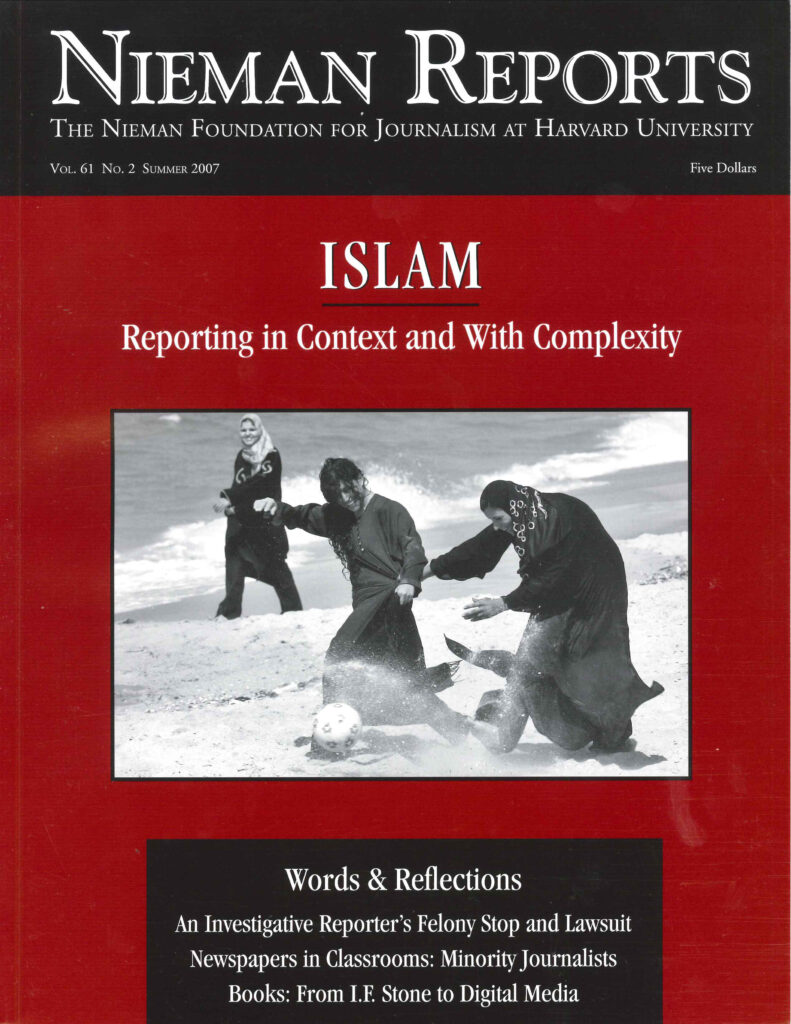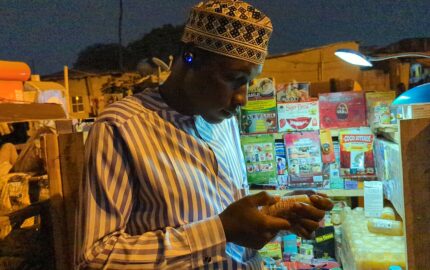
Abdel Moneim had already boarded the plane when the police came for him. He was probably looking forward to some sleep ahead of his gruelling tour of seven Arab countries reporting on human rights for the British satellite channel, Al Hiwar. It was one o'clock in the morning, Sunday, April 15th. He thought he would be spending the next few hours before daybreak in the skies; instead, he spent them being interrogated in Cairo's notorious Mahkoum prison.
On hearing the news, fellow Egyptian bloggers rallied to his cause. "Bad news RELATED WEB LINK
Abdel Moneim Mahmoud's blog
–ana-ikhwan.blogspot.comÉ blogojournalist and friend Abdel Moneim Mahmoud was detained by Mubarak's Gestapo early Sunday 1 am," reported leading Egyptian activist blogger Hossam el-Hamalawy. Wary of the threats facing the country's nascent blogosphere after the sentencing of Abdel Kareem Nabil to four years in prison in February for extremely provocative posts deemed "anti-Islam" and insulting to Egypt's President Hosni Mubarak, democracy activists were learning fast how to draw international attention to state infringements on free speech.
Kareem's story was something of a test case for Egyptian bloggers. Never before had they succeeded in bringing a fellow blogger's plight to so wide a global audience. Articulate and well-connected, prominent Egyptian bloggers gave interviews and courted the Western press. At the top of the pile was Sandmonkey—a self-styled "snarky, pro-U.S., secular, libertarian"—who described Kareem's sentence as a "huge blow" to freedom of expression in Egypt in a Washington Post editorial. That expression was typical of the press response in the United States, riling at Egypt's "zero tolerance" for secular democratic dissent.
Elsewhere, the man who became famous when he blogged from prison, Alaa RELATED WEB LINK
Alaa Abd El Fattah's blog
–manalaa.netAbd El Fattah, appeared on ABC News highlighting the threats faced by Egyptian bloggers in light of Kareem's sentence. Correspondent Wilf Dinnick concluded his story by describing Fattah as a "young Egyptian willing to risk everything" to bring real democracy. The Financial Times published a feature on another dissident blogger, Mohammed al-Sharqawi, who feared the worst following the Kareem verdict. Even the Fox News Web site featured a story about Kareem.
Clearly the Kareem case had touched a nerve. How could the Egyptians be getting freer in the age of the Internet—as government officials in the West would assert that they are—when citizens are being thrown into jail on charges so contrary to international human rights norms?
Kareem's predicament is, indeed, shocking and totally unacceptable. But few of the many commentators and reporters covering his case even mentioned that his blogging "friends" and supporters were reviled by much of his commentary. For example Sandmonkey, who deplored Kareem's sentence, described his writing as "pretty much hate speech" in a debate he participated in with Arab AUTHOR'S NOTE
Egyptian blogger Sandmonkey was part of a debate called "Blogging Impact in Egypt." Listen to the debate »Media & Society. Other Egyptian bloggers expressed distress that Kareem was hijacking their cause.
It certainly is the case that bloggers of all stripes are not the best team players around, and Egypt is no exception in this. But they stand up for each other in times of trouble because each depends on the oxygen that is freedom of expression online. In the case of Kareem, I often heard it argued that he cynically aimed to get himself into trouble, knowing full well where the red lines were, as a justification for seeking asylum in the West. Others close to him questioned his psychological health; still others described him as naive. But almost all bloggers argued that by courting the regime's wrath so wantonly, Kareem had given the authorities a perfect excuse to set a dangerous precedent, one that could see many of the savvier, more politically engaged activist bloggers ending up in jail.
Of course, these arguments are fraught with problematic questions, which refuse to go away. Why should a blogger—with no history of violence, subversive political activity, or anything that would imply an imminent threat—be put in jail under any circumstance? Whether Kareem's posts were driven by cynical intentions or not, he surely did not deserve what he got. Liberal commentators from the West could claim, perhaps justifiably, that Kareem's sentence was enough to prove the failures of Western efforts to enhance democracy, pluralism and free speech in Arab countries. In fact, British political commentator Nick Cohen, writing in The Observer, argued that Kareem's case showed that Western liberals had turned away from their "allies in the poor world."
Western Reporting on Arab Blogging
But despite all this, there is a subtext to Western reporting of Kareem's case that needs to be acknowledged. It comprises two elements:
In all of the reporting about Kareem's case, there was virtually no rigorous analysis of the makeup of the Egyptian blogosphere. Why did reporters fail to spot that Kareem was a figure of distrust for his allies in the blogosphere, as much as for state security? While it is true that bloggers supported his right to express himself, few of them supported what he was saying. And if they did, they would not say it publicly. The omission of this insight from reporting on this case is crucial: It is another example of a situation when what does not fit the prescribed narrative does not make the final cut. The arc of the story seemed preconceived—a young freethinker turns away from his traditional schooling at the Islamic Al Azhar University and becomes a democracy activist only to be jailed for his views.
This leads to the second element behind reporting of Kareem's case: Kareem was speaking out against what many Western commentators see as the twin roadblocks to reform in the Middle East—Islam and authoritarian states. Therefore, he could be neatly pigeonholed as yet another independent liberal thinker who overstepped the line.
This brings us back to Abdel Moneim. He is also a blogger, a democracy activist, and a freethinker. He was also detained without charge solely, we assume, for expressing himself. His story does not match the newsworthiness of Kareem's four-year prison sentence—at the time of this writing, Abdel Moneim has not been charged or sentenced—but it still relates very closely to the same issues of authoritarianism and freedom of speech. Yet reporting on Abdel Moneim had been very slow off the blocks, if nonexistent.
In late April, The Wall Street Journal published an excellent report by Mariam Fam about the emergence of Muslim Brothers bloggers that included a reference to Moneim roughly a week into his detention. But the issue of constraints on freedom of expression was certainly not the lead to this story. Nor was this issue the central theme to James Traub's extended New York Times Magazine feature analyzing the Muslim Brotherhood's democratic credentials (Traub did not mention Moneim's detention or even bloggers). Elsewhere , Global Voices Online and the Committee to Protect Journalists have followed the story, but few other news outlets have taken it up.
Why did one blogger's jailing receive so much attention in the Western press while another's has not?
Abdel Moneim Mahmoud is at the forefront of the new generation of Muslim Brothers activists. I have interviewed him on several occasions, most recently with The Guardian's Timothy Garton Ash, and found him to be a committed reformer and supporter of democratic elections—in fact just the kind of person Western governments should be dealing with in the Middle East. That he supports Kareem's right to pursue his inflammatory "anti-Islam" blog shows that Abdel Moneim really does aspire to greater political openness in Egypt, not just a greater role for Islam. But as a member of Egypt's largest opposition group—the Muslim Brothers—he faces a constant threat from Egypt's authoritarian regime with the quiet complicity of Western states.
AUTHOR'S NOTE
Lynch's book, "Voices of the New Arab Public: Iraq, al Jazeera, and Middle East Politics Today," was published by Columbia University Press. He also blogs at abuaardvark.typepad.co/. Read his article, "Blogging the new Arab public" »Despite this, Abdel Moneim's dedication to the online debate of critical issues is hard to question. Writing in Arab Media & Society, Marc Lynch, a Williams College political science professor who blogs about Arab media, points to the incredible similarity between the "Free Kareem" campaign, which so caught the attention of the liberal West and the press, and the online efforts to free Brotherhood members, led by Abdel Moneim.
Blogs in the Arab Middle East have empowered pro-American liberal secular voices, and they have also empowered those whose primary political reference is Islam. Yet as these debates have emerged online, Western reporters have tended to focus their reporting attention only on specific aspects of this debate and discussion. In reading their coverage, it is clear that many of them mistakenly think that only those sharing a Western vision of modern society can freely exchange ideas and take part in engaged debate online. Without reporting more broadly—and that means providing informed context for those who encounter their reporting—Western journalists will regurgitate the same skewed view of the Middle East as has often dominated in the past—blogs or no blogs.
George Weyman is the managing editor of Arab Media & Society, which can be read at www.arabmediasociety.org. He received a graduate degree in Modern Middle Eastern Studies from the University of Oxford and has worked at the Panos Institute and Sky News.


